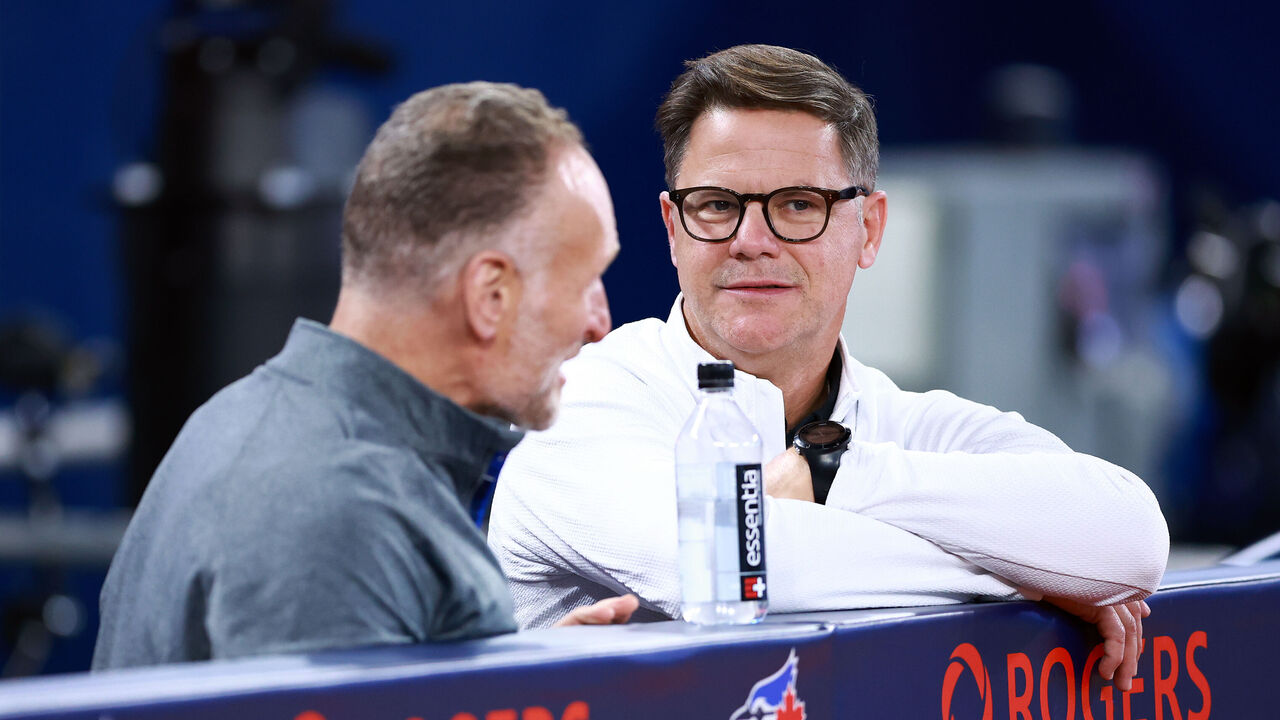Blue Jays double down on status quo to fix status woe
When you're spending close to $5 billion to acquire majority control of the country's biggest sports conglomerate, perhaps it's difficult to put extra funds toward severance payments at your baseball club.
That's one theory for the continued employment of the Toronto Blue Jays' leadership team, from president through manager: The pending MLSE purchase is taking up a lot of Rogers' pennies. Other theories for the status quo are available: loyalty, patience, stubbornness. Maybe even foolishness.
Whatever the case, it's been evident for months that Rogers Communications, the team's owner, intended to run it back in 2025 despite a calamitous 2024. There was no point in keeping manager John Schneider in the dugout to oversee the season's final wheezes unless he was returning next year. It didn't make sense to let general manager Ross Atkins handle the trade-deadline sell-off unless he was expected to try to salvage something from that reset in 2025. And Mark Shapiro was likely never in any real trouble: The team president has overseen massive infrastructure projects in Dunedin and now Toronto, which was always the big-picture purpose of his hiring. Rogers wanted to transform the Jays into a modern MLB club, and they are closer to that than they were before.
They just can't seem to win a playoff series - or, more recently, a playoff game.
And yes, a large chunk of the team's fan base (and local media) has had it in for Shapiro and Atkins since they arrived a few months apart nine years ago to replace a legendary team boss and a homegrown general manager. But what's remarkable about their longevity is how every disappointment has come with a qualifier.
The 2016 team that lost in the ALCS: Yes, the Jays had taken a step back from the previous season, but the front office inherited a tired and creaky roster.
The 2017-19 teams that lost more than they won: Rebuilding. Had to be done.
The 2020 team that made the playoffs then went splat: Ahead of schedule, good learning experience.
The 2021 team that missed the playoffs by one game: Hey, the Jays won 91 times. It's a tough division. Plus, they needed a change at manager. Schneider replaced Charlie Montoyo - all set.
The 2022-23 teams that made the playoffs and got swept in the first round: What can you do? Playoff baseball is unpredictable.

That brings us to 2024. Even if you're inclined to take a glass-half-full view of the front office's performance, it's very hard to come up with an explanation for this season's failings that doesn't assign at least some blame to the men in charge. The bullpen was essentially a pile of discarded munitions and gasoline cans, and these were all pitchers that the current regime acquired. The offense was Vlad Guerrero Jr. and a bunch of wet firecrackers. This came after the front office pivoted to run prevention for 2023 and then went into 2024 relying on internal improvements to goose poor performances at the plate.
If there's a better example of a top-down directive to change a team that blew up this spectacularly, it does not leap to mind. The Blue Jays scored 671 runs in 2024, their lowest mark in a full season since 1997, when Roger Clemens was the staff ace and Cito Gaston was fired from his second managerial tour with the club.
Was some of that downturn hard to foresee? Sure. Bo Bichette's dreadful season came out of nowhere, and George Springer's expected gradual decline looked more like falling through an open manhole. But many of the Jays hitters who struggled - Alejandro Kirk, Kevin Kiermaier, Daniel Vogelbach, Cavan Biggio, Justin Turner - were guys the front office envisioned as part of a playoff offense. After the Jays' failed Shohei Ohtani pursuit - which sadly remains the high point of their season - management made a bunch of bets on offense, and almost all of them were busts. At least Isiah Kiner-Falefa outperformed expectations?
The message from Wednesday's year-end press conferences was that all of this was disappointing, but there was still trust in the process - unless you count moving Don Mattingly from offensive coordinator to bench coach as "blowing it up." (You shouldn't.) The executives recognized that internal improvements were needed. Also needed: external improvements. That's usually true of a last-place roster.
And so now Rogers will task the same Blue Jays leadership team with trying to put together a group that will score something like 100 more runs and win maybe 20 more games in a seemingly final attempt to manufacture a contender inside this competitive window, all while figuring out how to handle the long-term futures of two franchise cornerstones.
That's a tough ask for anyone. It's tempting to say that the fellows in charge have to deliver results this time, or else.
But there's little evidence that "or else" means much of anything in Toronto.
Scott Stinson is a contributing writer for theScore.